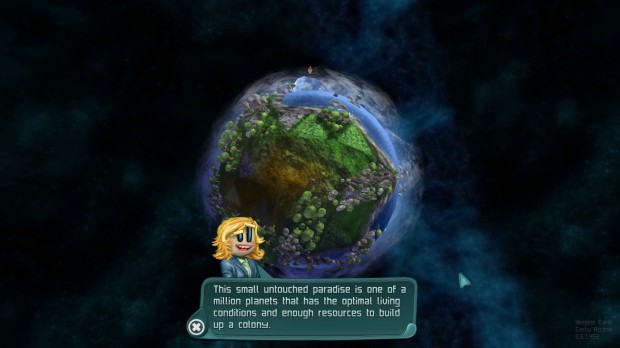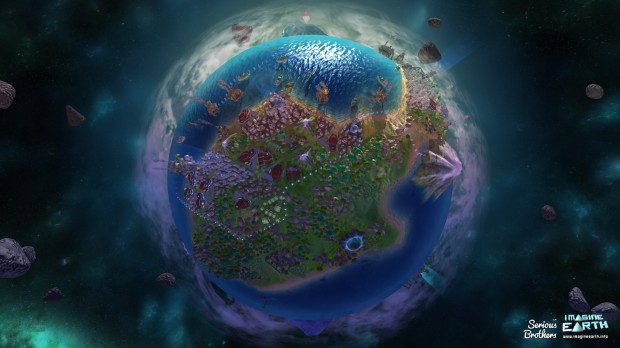In this week’s interview with an indie developer, we catch up with studio Serious Brothers to talk about the motivation behind their ecosystem-simulating ‘serious’ game Imagine Earth out on Steam Early Access today.
What got you into game development and how was Serious Brothers formed?
We were passionate gamers before we switched from playing to making games. We teamed up for this project, and both of us would not have expected a simulation game to be the first thing we’d do. But the idea behind Imagine Earth was so enthralling that it has kept us busy and motivated for several years already. It all began as an enthusiastic student project before we founded a startup, and it’s already won two awards with our first production.
Where did the name Serious Brothers come from, and how did you go about choosing it as the name of your studio?
We called our studio Serious Brothers at some point because a long-term production like this really does weld us together. Martin does the programming and Jens is responsible for
all the design stuff. Nothing works without the other. It also originates a bit from our intention to reinvent the label “serious games,” making projects that deal with an important issue and are also seriously good games at the same time.
When you guys aren’t developing indie games, what do you get up to?
We try our best to spend some time with our significant others and do sports to stay fit. Martin is also developing applications for health care and Jens is working with media art such as interactive video installations.
Could you tell us a little about Imagine Earth ? What inspired you to make this game?
Global warming is such a tremendous catastrophe that there should be at least one game covering it as its major game dynamic and puts it into a gameflow that is as thrilling as motivating. The concept of letting players shape the fate of whole planets and their own civilisations got more and more important over the years. Overgrowth and destruction is often the result of growing your population. Somehow it feels natural and there is no need for being unreasonably moral or educational. The player will experience it on his own, and it’s fun to realize that it’s your own decisions that might come back later and make it really hard to win the game.
[youtube link=”https://www.youtube.com/watch?v=pvEr_NY6gy4″ width=”590″ height=”315″]
What is your main vision of the game, and why will gamers fall in love with Imagine Earth over any other game in its genre?
In comparison to many other major sim titles we did not want to keep the player busy with over-detailed micromanagement with endless production lines and resource dependencies. We have four major resources to take care of, and it’s all about balancing their use and production to achieve an effectively growing colony. It’s a unique city and planet simulation with strategy and dynamic puzzle elements. And for many people, it’s a big surprise how much compassion is triggered by a planet falling to destruction and ecocide as result of their actions and how much joy it is to find a way out.
We’ve played the Early Access version of Imagine Earth and even managed to hit the top-3 in the leader boards. It’s a pretty relaxing game. We did have a few reservations about the interface/visible cues to players and the radial menu though – are there any plans for improvements in these areas?
There will be more degrees of difficulty to offer a challenge to everyone, and the dynamic potential will be revealed in the time trial mode. The early access version will come up with a four-times bigger planet and introduce the research menu where the player makes constant progress by upgrading his tools and technologies. We are glad about all the feedback we can get – thanks for your constructive review “Early Look @ Imagine Earth” by the way. We also got rid off the manual tax collection, and we made many improvements regarding the graphics, shadows and daylight simulation on the planets.
Will there be a sandbox style mode for players where they can get more invested in a colony long-term, rather than just the short missions?
Yes, absolutely! The missions are a great start to introduce the units and game mechanics, and the free play mode will offer the player the freedom to populate the planets without any restrictions.
How did you go about designing and producing the game? Can you tell our readers a little more about your process and working methods?
We meet at least once a week to discuss every new feature passionately before we realise it. Otherwise we coordinate ourselves by chat or phone and organize todos and development plans with a chosen set of tools and webservices. We define weekly dev sprints and are constantly checking how long every step takes to get a better feeling for it. Since the crowdfunding, we’ve started to write weekly dev news on our blog.
How are you guys finding the indie developer life so far? The biggest discussion we always have with indie developers is how hard it can be from a financial point of view. What is your solution?
Our choice for the last years was to develop Imagine Earth as a side project to get all the necessary love, time and independence into this game. Starting this year we decided to take the next step. We founded a startup and applied for fundings. From now, 50% of our costs get pre-financed by a governmental cultural media fund because of the environmental background of the game, and the other part is payed by our savings, side jobs and the crowdfunding. This puts us into a quite good position to continue and finish the development of Imagine Earth by the end of this year…
Have you got any other projects in the pipeline you can tell us about – either in production or at the ideas stage?
There is no other stuff in production yet; right now Imagine Earth takes all our creative and productive resources. But we (especially Jens) have a lot of interesting ideas which tend to be much more narrative and atmospheric.
If time and money was no object, what kind of game would you see yourselves producing?
Exactly such circumstances led to the creation of Imagine Earth and made it exceptional in many ways. And so we’re just looking forward to completing this one for now!
Thank you very much for your time! We’d like to wish you the best of luck and hope we’ll see your studio release some great games in the near future! Keep us informed :-)
You’re welcome. Thanks for your interest!

